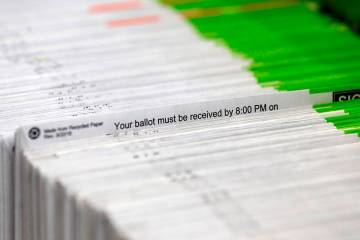EDITORIAL: Inflation eats Nevada’s minimum wage hike
If Democratic policies keep fueling inflation, what was once the “Fight for $15” will soon be the “Fight for $50.”
On July 1, Nevada’s minimum wage increased to $10.50 an hour for positions without qualifying health insurance. If that benefit is offered, the minimum wage is $9.50 an hour. The latest boost represents a 75-cent increase.
Over the next two years, the minimum wage will increase twice more. In 2024, it will hit $12 an hour and $11 an hour, respectively. A November ballot question would set the minimum wage at $12 an hour for all workers.
Government mandates aren’t needed to increase wages. A scarcity of workers accomplishes that task quite well. That’s what Nevada and the nation have right now. There were more than 11 million job openings at the end of May. Many factors contribute to the country’s labor shortage, but one result is clear. Businesses are raising wages in a desperate attempt to find employees.
“Every employer that I talk to, they’re far above (the minimum wage), and they’re still having trouble attracting people, so I don’t think it’s going to impact the job market,” Gov. Steve Sisolak said recently about the wage hike.
Less than 1 percent of Nevada workers earn at or below the minimum wage. If you want to make more than the minimum wage, any number of companies will be happy to hire you. That includes those seeking entry-level positions.
What’s happening currently is the best-case scenario for minimum wage laws. The artificial wage floor is set below market wages. While politicians take credit for raising wages, their actions are effectively window-dressing on what was already happening.
The worst-case scenario is when a recession decreases demand for employees. That can lead to minimum wage laws preventing businesses from hiring people at market rates.
Inflation is hurting everyone, and minimum wage workers are no exception. Going from $9.75 an hour to $10.50 an hour is a 7.7 percent increase. The inflation rate, however, reached 8.6 percent in May. That means minimum wage workers would be better off making $9.75 an hour while paying last year’s prices. Potential changes, such as indexing the minimum wage to inflation, could contribute to a wage-price spiral that makes inflation worse. At this rate, demands for a $50-an-hour minimum wage will be here before you know it.
This is the ironic dichotomy of government-mandated minimum wage hikes. When times are good, they’re unnecessary. When times are bad, they heighten economic troubles, especially for the least-skilled workers.




























